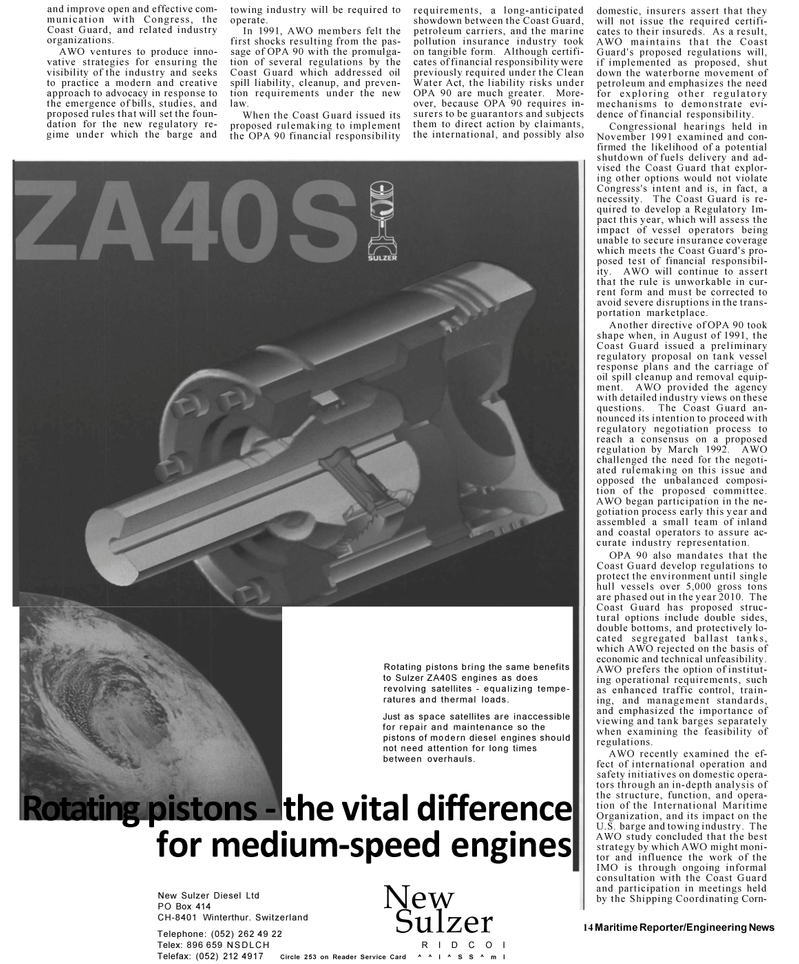
Page 12: of Maritime Reporter Magazine (March 1992)
Read this page in Pdf, Flash or Html5 edition of March 1992 Maritime Reporter Magazine
and improve open and effective com- munication with Congress, the
Coast Guard, and related industry organizations.
AWO ventures to produce inno- vative strategies for ensuring the visibility of the industry and seeks to practice a modern and creative approach to advocacy in response to the emergence of bills, studies, and proposed rules that will set the foun- dation for the new regulatory re- gime under which the barge and towing industry will be required to operate.
In 1991, AWO members felt the first shocks resulting from the pas- sage of OPA 90 with the promulga- tion of several regulations by the
Coast Guard which addressed oil spill liability, cleanup, and preven- tion requirements under the new law.
When the Coast Guard issued its proposed rulemaking to implement the OPA 90 financial responsibility requirements, a long-anticipated showdown between the Coast Guard, petroleum carriers, and the marine pollution insurance industry took on tangible form. Although certifi- cates of financial responsibility were previously required under the Clean
Water Act, the liability risks under
OPA 90 are much greater. More- over, because OPA 90 requires in- surers to be guarantors and subjects them to direct action by claimants, the international, and possibly also domestic, insurers assert that they will not issue the required certifi- cates to their insureds. As a result,
AWO maintains that the Coast
Guard's proposed regulations will, if implemented as proposed, shut down the waterborne movement of petroleum and emphasizes the need for exploring other regulatory mechanisms to demonstrate evi- dence of financial responsibility.
Congressional hearings held in
November 1991 examined and con- firmed the likelihood of a potential shutdown of fuels delivery and ad- vised the Coast Guard that explor- ing other options would not violate
Congress's intent and is, in fact, a necessity. The Coast Guard is re- quired to develop a Regulatory Im- pact this year, which will assess the impact of vessel operators being unable to secure insurance coverage which meets the Coast Guard's pro- posed test of financial responsibil- ity. AWO will continue to assert that the rule is unworkable in cur- rent form and must be corrected to avoid severe disruptions in the trans- portation marketplace.
Another directive of OPA 90 took shape when, in August of 1991, the
Coast Guard issued a preliminary regulatory proposal on tank vessel response plans and the carriage of oil spill cleanup and removal equip- ment. AWO provided the agency with detailed industry views on these questions. The Coast Guard an- nounced its intention to proceed with regulatory negotiation process to reach a consensus on a proposed regulation by March 1992. AWO challenged the need for the negoti- ated rulemaking on this issue and opposed the unbalanced composi- tion of the proposed committee.
AWO began participation in the ne- gotiation process early this year and assembled a small team of inland and coastal operators to assure ac- curate industry representation.
OPA 90 also mandates that the
Coast Guard develop regulations to protect the environment until single hull vessels over 5,000 gross tons are phased out in the year 2010. The
Coast Guard has proposed struc- tural options include double sides, double bottoms, and protectively lo- cated segregated ballast tanks, which AWO rejected on the basis of economic and technical unfeasibility.
AWO prefers the option of institut- ing operational requirements, such as enhanced traffic control, train- ing, and management standards, and emphasized the importance of viewing and tank barges separately when examining the feasibility of regulations.
AWO recently examined the ef- fect of international operation and safety initiatives on domestic opera- tors through an in-depth analysis of the structure, function, and opera- tion of the International Maritime
Organization, and its impact on the
U.S. barge and towing industry. The
AWO study concluded that the best strategy by which AWO might moni- tor and influence the work of the
IMO is through ongoing informal consultation with the Coast Guard and participation in meetings held by the Shipping Coordinating Corn- 14 Maritime Reporter/Engineering News
Rotating pistons bring the same benefits to Sulzer ZA40S engines as does revolving satellites - equalizing tempe- ratures and thermal loads.
Just as space satellites are inaccessible for repair and maintenance so the pistons of modern diesel engines should not need attention for long times between overhauls.
Rotating pistons - the vital difference for medium-speed engines
New Sulzer Diesel Ltd
PO Box 414
CH-8401 Winterthur. Switzerland
New Sulzer
Telephone: (052) 262 49 22
Telex: 896 659 NSDLCH RlDCOl
Telefax: (052) 212 4917 Circle 253 on Reader Service Card ^^I^SS^mI

 11
11

 13
13
